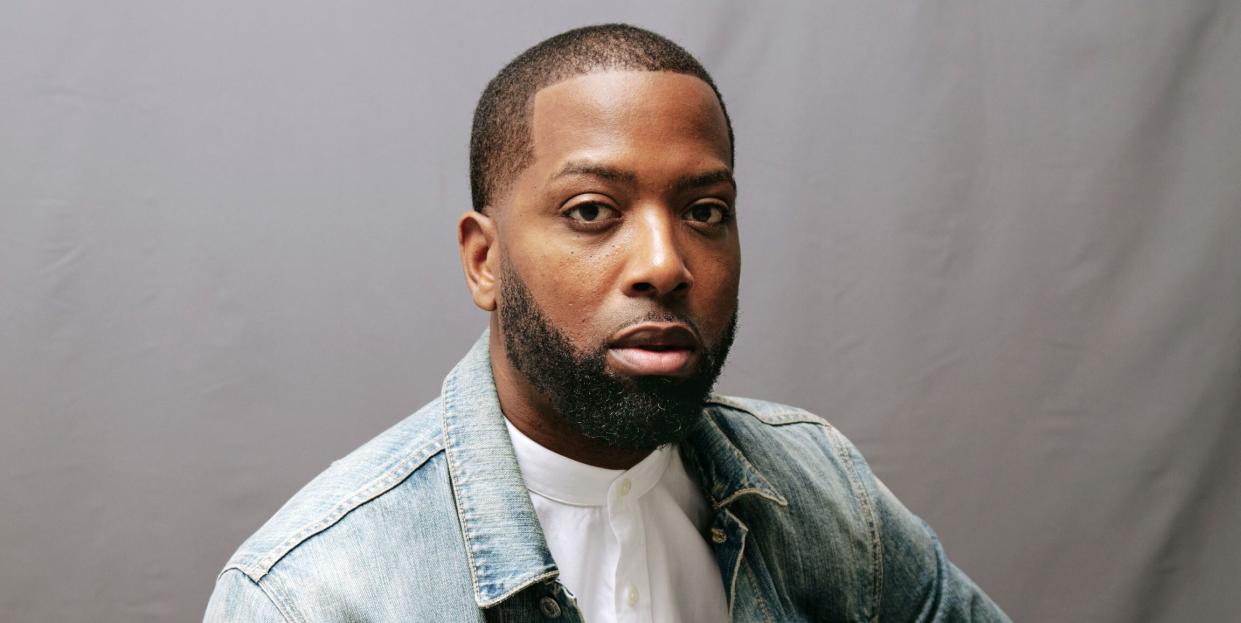I Created a Shaving Brand for Black Men Because We Deserve Better

I started Bevel for one good reason: I couldn’t shave. For 15 years, every single way that I encountered facial-hair removal sucked.
When I was an intern on Wall Street, I had some facial hair. One day, I was called out by a supervisor, in front of all the other employees, for not being clean-shaven. My confidence took a major hit. If you have curly hair—and most Black men do—using multiblade razors regularly leads to ingrown hairs, skin irritation, and razor bumps. Razor bumps occur because multiblade razors cut the hair underneath the surface, and as it grows back, it curls beneath the skin, as opposed to above it, creating an ingrown hair.
I couldn’t use electric trimmers—although I did—because a lot of times barbers will use the same electric trimmer on your face that they use on everyone else’s hair. The last thing I tried, which was the worst one, was a depilatory cream that I used for years. I was fed up with the smell in the bathroom and with the damage it had done to my skin over time.
Black men suffer disproportionately from these issues. These things impact the confidence of our community yet have frankly gone ignored for almost the entire 200-year history of the health and beauty industry. I felt that I could do better for an audience that I care very deeply about and a community that I’ve been a part of my entire life.
Bevel was launched in 2013 out of that hope and vision. I felt that Black consumers deserved better—not only products that work but a beautiful, communicative, authentic brand experience that we had all sought our entire lives. Our first product was the Shave Kit, a shave system that includes a razor, a shave brush, replacement blades, priming oil, shave cream, and a restoring balm. The double-blade razor works better on curly hair because it cuts only the hair on the surface, leaving the hair underneath to grow back properly.
Being one of the first Black people to create something in the modern grooming field was tough. I kind of had to form my own narrative. But I’m inspired by folks who have to deal with the mundanity of life—they wake up and shave every single day, even if the products aren’t right for their needs, because this is a requirement for them, the folks who have a story that is similar to mine, where they were asked to shave the hair off their face without any tools to use. I’m inspired to find things that work for them. I’m inspired to build and motivate other Black entrepreneurs and businesses along the way.
We got turned down by probably 99 percent of the people we reached out to for investment. Many of the folks on the other side of the table didn’t reflect the audience that we serve. So I get it. I understand the lack of genuine and authentic understanding, but they left money on the table. I had to really build the conviction in myself. But it’s funny, because once we launched Bevel, one of our top three regions for sales in the country was the Bay Area. And I don’t think people were buying just because we happened to be there. There were people who heard about it and needed it.
After we partnered with Procter & Gamble in late 2018, we moved the company to Atlanta because we wanted greater access to our customers and a diverse talent pool. And moving there turned out to be a great decision both for the company and for me personally. The Bay Area is the first place I’ve ever lived that felt like it got less diverse as time went on, and I think the gap between the haves and the have-nots has widened because Silicon Valley has gotten a hell of a lot more powerful.
But when it comes to actually making change and truly fostering an environment of inclusion in your company, I’d say two things: First, know what your values are. How do you lead, recruit, retain, if you don’t know that you’re hiring or trying to retain people who have the same values that you do? At my company, we haven’t done anything special, in terms of building our team, other than defining what our values are—courage, inspiration, respect, judgment, wellness, and loyalty.
And the second thing: I think there’s always this goal, especially in large corporations, of proportionality. They often say, “Black people are 13, 14 percent of this country, so let’s have 13 or 14 percent of our workforce be Black.” But why can’t more than 50 percent be Black? Where is this assumption that having proportionality is the best option? Instead consider that these consumers have the most cultural impact and purchasing power.
I feel like it’s my duty to share with the world how impactful our community is in the world. Not only as consumers but also as producers.—As told to Temi Adebowale
You Might Also Like

